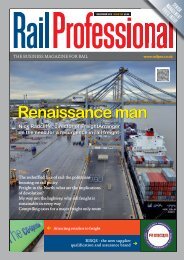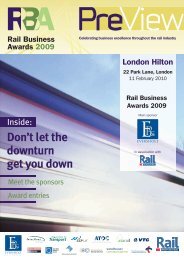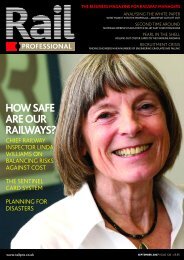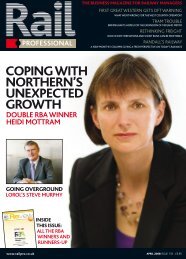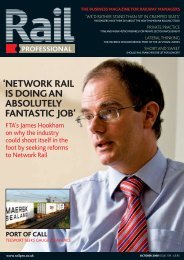move over freightliner, we want to get into ... - Rail Professional
move over freightliner, we want to get into ... - Rail Professional
move over freightliner, we want to get into ... - Rail Professional
Create successful ePaper yourself
Turn your PDF publications into a flip-book with our unique Google optimized e-Paper software.
INTERVIEW<br />
‘We are key <strong>to</strong> UK plc, whether it be containers<br />
coming through big ports or whether it be coal<br />
traffic. A better appreciation amongst politicians of<br />
the importance of freight in the DfT is really needed’<br />
Felixs<strong>to</strong><strong>we</strong>, in order for rail <strong>to</strong> keep up with market growth in<br />
container shipments. Britain is importing more and more<br />
goods each year as manufacturing is increasingly outsourced<br />
<strong>to</strong> Asia, but the railways won’t be able <strong>to</strong> keep up without some<br />
infrastructure changes. At the moment, Felixs<strong>to</strong><strong>we</strong> has very<br />
little capacity for any extra rail services, mainly because the<br />
line out of it is just a single track.<br />
‘What <strong>we</strong>’re trying <strong>to</strong> assure at the moment is that the<br />
infrastructure’s going <strong>to</strong> be there, such as twin tracking from<br />
the port of Felixs<strong>to</strong><strong>we</strong>. The Port of Felixs<strong>to</strong><strong>we</strong> is going through<br />
the planning process, but once that goes ahead, there’ll<br />
probably be an increase of 50-75 per cent freight traffic out of<br />
there. The difficulty, of course, is a lot of it goes round where<br />
the Olympics is, where Crossrail is.’<br />
Smith is hoping the Freight Utilisation Strategy will bring<br />
about some much-needed changes. ‘An integrated freight<br />
strategy would be good from the G<strong>over</strong>nment. You sometimes<br />
wonder whether there is any joined-up thinking. We are key<br />
<strong>to</strong> UK plc, whether it be containers coming through big ports<br />
or whether it be coal traffic. Coal is still 50 per cent of the<br />
generation of electricity in the UK. Maybe it’s our own fault,<br />
but a better appreciation amongst politicians of the importance<br />
of freight in the DfT is really needed.’<br />
The remainder of GBRf’s work is in infrastructure services<br />
and hiring out train crew for haulage work. The company has<br />
just extended its contract with Serco, <strong>to</strong> drive its rail grinding<br />
and infrastructure moni<strong>to</strong>ring services for Network <strong>Rail</strong>.<br />
One of GBRf’s most prestigious contracts is driving trains<br />
for Royal Mail. EWS <strong>to</strong>ok this on after privatisation, but after<br />
a few years Royal Mail decided <strong>to</strong> carry all its mail by road.<br />
Three years ago, GBRf managed <strong>to</strong> convince them that it was<br />
a waste <strong>to</strong> have unused mail trains sitting about, so it has begun<br />
running some of them again. The contract was worth around<br />
£50m in EWS’s time, but it’s just a small job now, bringing in<br />
£3 or £4m for GBRf. The contract is currently up for renewal<br />
and GBRf is hoping <strong>to</strong> extend it, perhaps for a longer period<br />
this time.<br />
‘We provide the drivers and <strong>we</strong> manage the trains for them,<br />
and <strong>we</strong> interface with their logistics teams <strong>to</strong> operate the<br />
services,’ says Smith. ‘They buy one train <strong>to</strong> Glasgow and one<br />
train from Glasgow <strong>to</strong> London a day and <strong>we</strong> operate those.<br />
We’re very flexible in being able <strong>to</strong> adapt. We’ve done things<br />
like re-routing after Grayrigg and increasing capacity when<br />
roads <strong>we</strong>re closed after the Hemel Hempstead fire.’<br />
Smith, 45, started out as an engineer on the railways, having<br />
begun as a <strong>to</strong>olmaker. He joined British <strong>Rail</strong> almost 30 years<br />
ago and ended up running maintenance depots. At<br />
privatisation he worked in Norwich for Anglia <strong>Rail</strong>ways, part<br />
of GB <strong>Rail</strong>ways, and rose <strong>to</strong> deputy managing direc<strong>to</strong>r. He was<br />
then offered the chance <strong>to</strong> head up a new freight division, and<br />
the rest is his<strong>to</strong>ry. He’s now based in Kettering, near<br />
Peterborough, dividing his time bet<strong>we</strong>en the London office<br />
and various depots around the country.<br />
So, what next for GBRf? Will it be entering in<strong>to</strong> the<br />
supermarket market, like DRS has done with Eddie S<strong>to</strong>bart?<br />
Or perhaps expanding in<strong>to</strong> Europe, like Freightliner has?<br />
The ans<strong>we</strong>r <strong>to</strong> both is ‘quite possibly’.<br />
‘I think as green politics come in<strong>to</strong> play, it begins <strong>to</strong> swing<br />
it,’ he says of the supermarket market. ‘It’s difficult <strong>to</strong> make<br />
these trains pay if <strong>we</strong>’re carrying the risk of filling the trains.<br />
And I don’t know how the deals work that exist bet<strong>we</strong>en DRS<br />
and S<strong>to</strong>bart. You can make money out of freight <strong>over</strong> short<br />
distances if you can <strong>get</strong> the utilisation of the assets.’<br />
And this is one of the key things for a small company like<br />
GBRf, which pays a lot for its locos – and pays good wages <strong>to</strong><br />
its drivers. The company pays a high rate for leasing them<br />
because it <strong>get</strong>s them in smaller batches than its larger rivals<br />
would, plus it didn’t inherit any at privatisation. So GBRf can’t<br />
afford <strong>to</strong> have locomotives sitting around unused for long,<br />
making infrequent runs <strong>to</strong> obscure destinations unworkable,<br />
unless the loco can be put <strong>to</strong> work doing something else in<br />
bet<strong>we</strong>en.<br />
‘You tend <strong>to</strong> end up with the train in the wrong place and<br />
then sending a driver up <strong>to</strong> fetch it. Unless you can <strong>get</strong> a fivetrains-a-<strong>we</strong>ek<br />
type of service, you have <strong>to</strong> find other ways <strong>to</strong><br />
<strong>get</strong> value for money out of your assets. The key <strong>to</strong> it is flexible<br />
workforce and utilisation of your assets. It’s like planes, if<br />
they’re sat on the ground, they’re not earning money.’<br />
GBRf currently leases 27 Class 66s and five Class 73, plus<br />
a few old electro-diesels used in the south of England and a<br />
handful of others for shunting.<br />
14 RAIL PROFESSIONAL : MAY 2007



